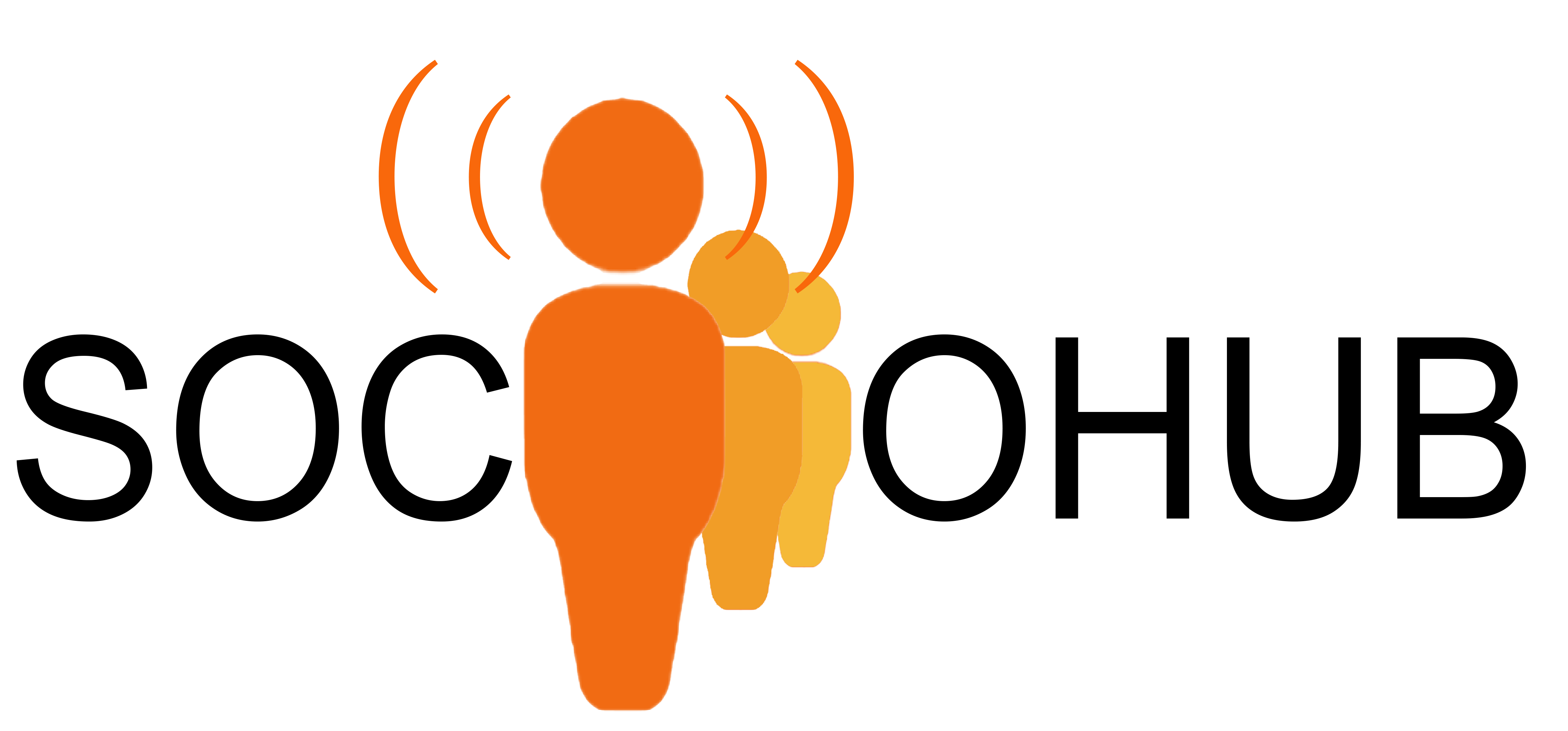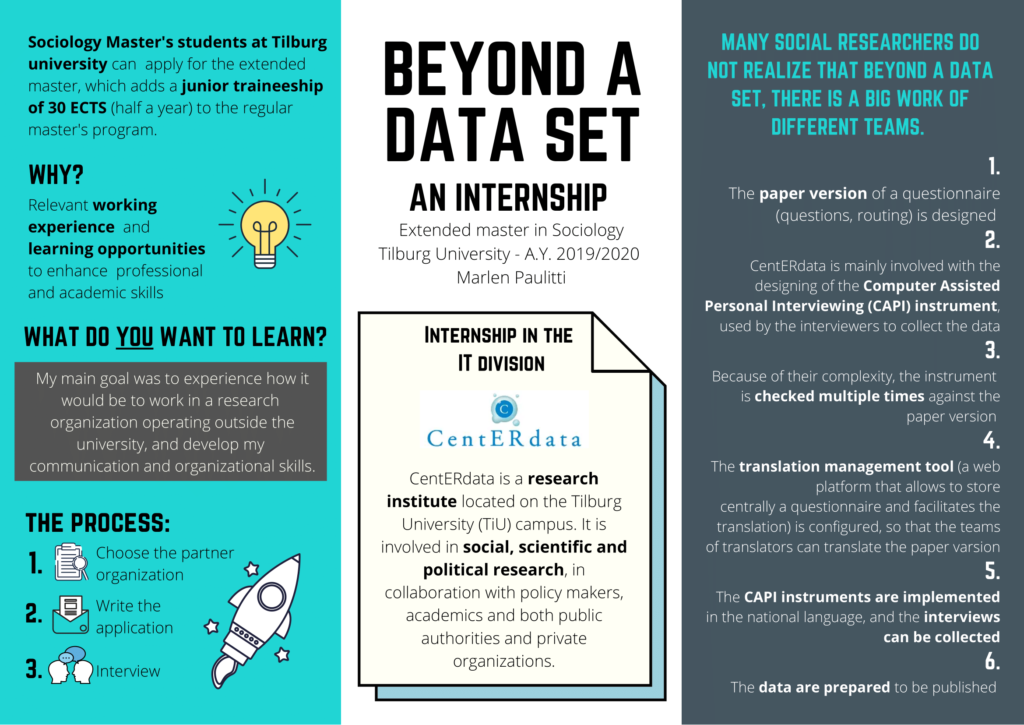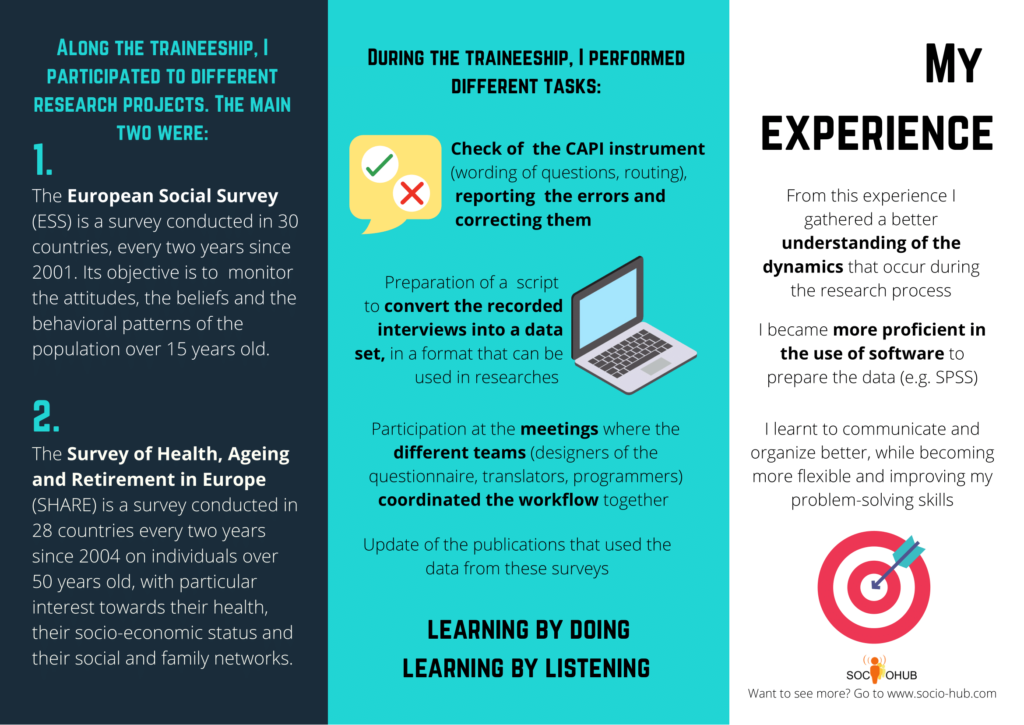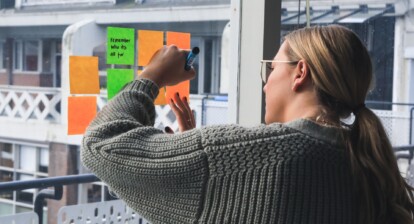I have often been told that theory is important and that it is the best ground on which you can build upon. However, after concluding my bachelor in sociology, not even thinking about this, helped me to not spiral into an existential crisis: I had a solid theoretical basis, but what about the practice? I could happily explain the theory of social integration by Emile Durkheim (one of sociology’s godfathers), but what about the real world? I almost had no practical experience on social research and knowing that I studied an “Handbook of research methodology” was of no consolation. While I felt the –theoretical- ground crumbling under my feet, I realized that, after all, nothing was still lost: I decided that I would catch up.
I had a solid theoretical basis, but what about the practice?
A practical solution
I chose to apply for the master in sociology at Tilburg University after seeing the strong applied orientation of the courses and the opportunity to extend the master with a junior traineeship of 30 ECTS (each ECTS corresponds to 25-30 hours). I did not set up a precise plan, I just wanted to take all the opportunities I had and learn as much as possible.
There were several organizations both within and outside the university affiliated to this program and to which a student can apply. I had always been interested in the field of social research but, at the same time, I was not lured by the world of academia. I applied for an internship among three of the organizations affiliated to the extended master program, although it is also possible to do it at a non affiliated organization as well (in this case the student is in charge of getting in contact with the organization).
If you are unsure of the institution that would better fit your interests, as I was, it is always better to ask someone who knows more. Google can be an optimal source of information, but it may also contribute to increasing the doubts and the questions. The professors and the student-assistants are more familiar with the organizations and in most cases are willing to help you and to address you to the place that gives you the best potential to learn more about your interests. Finally, take into account that, for some organizations, being fluent in Dutch may be necessary, so ask for this kind of information as well.
One cold December morning, I received an email announcing that my first choice’s organization was interested and that we would have an informal interview. CentERdata is a research institute involved in social, scientific and political research, in collaboration with policy makers, academics and both public authorities and private organizations. I was particularly interested in some of the innovative methods they used in the previous research, such as HappyHier (an app to measure the extent of the environment’s quality on the well-being of people). During the interview, I met Eric Balster and Maurice Martens, my future supervisors, who explained me that I would mainly be involved in the workflow of the 10th wave of the European Social Survey (ESS) and the 8th wave of the Survey of Health, Ageing and Retirement in Europe (SHARE).
The first one is a survey conducted in 30 countries, every two years since 2001. Its objective is to monitor the attitudes, the beliefs and the behavioral patterns of the population over 15 years old. The second one is a survey conducted in 28 countries every two years since 2004 on individuals over 50 years old, with particular interest towards their health, their socio-economic status and their social and family networks. Although it was not what I expected, I was very thrilled by this perspective: in a couple of university courses, I remember using the data from ESS, and, while I was reading more about this survey, it looked as something very far away, at another level. I could not ask for something better.
However, this is not always the case: if you are not convinced by the type of traineeship an organization is offering, do not be afraid to express your doubts and tell what are your interests, why you chose them and ask if there is any other project in which you may collaborate. It is better for both you and the organization.
What’s behind a data set
I did my traineeship at the IT department, which was involved with the collection, and the dissemination of the data and the publications related to the two surveys I described in the previous section, although to different extents.
The concepts of “CAPI” (Computer-assisted personal interviewing), “research instrument”, “data collection”, which I studied in my “Handbook of research methodology”, materialized as I worked on these research projects. Let me tell you that the chapters I studied, although contributed to my general understanding, do not do justice to the complexity of the process behind the preparation of a data set.
Because of the wide-ranging nature of the ESS and SHARE surveys, the work is subdivided among different teams that supervise different phases of the process. CentERdata is mainly involved with the designing of the CAPI instrument lately used by the interviewers to collect the data. A team of designers gives the instructions on the content of the questionnaires; successively, the programmers transfer it into the CAPI instrument. This phase is not linear: multiple checks are done to ensure that every comma is in the right place, as well as the wording, the order and the routings of the questions. One of my main tasks was to check and report the bugs in the software and, after some explanation, I also started to resolve some of the simpler ones myself. While this process can be boring at times, putting this task in a wider perspective, by thinking that it was part of these research projects, made it worth it. Moreover, it helped me to develop an eye for the details, which I did not have before.
Another assignment on which I devoted some time, was the writing of a script, using SPSS (a software for statistical analysis), to convert the raw data that would be gathered with the 10th wave of ESS into a dataset ready for the dissemination. The task itself was not complex: it pertained recoding the categories of the variables according to the right values and labels, renaming the variables with the correct name and attaching the right labels. However, it turned out to be more difficult than expected, as I had never used SPSS before. Moreover, some variables required to be pre-processed.
This task was the one where I was more independent: I learnt by doing, which led me to make many mistakes but also allowed me to have a deeper understanding of how SPSS works, and especially what are the factors to pay attention to. Even if I made some mistakes, I learned how to deal with certain problems (though not in the fastest way) and I started to plan a strategy to deal with the tasks that I did not know how to perform, instead of groping in the dark without knowing where to start.
Finally seeing the daylight
Wrapping things up, I can say that this internship allowed me to fill the void I was feeling, by allowing me to make some relevant experience in a field I was (and I am still) interested in. Moreover, I have gained a better understanding of what I would like to do in the future.
Indirectly, I learned how to manage time (having to conciliate both the university and the tasks as an internee) and how to communicate better (asking is the best way); which I believe will make me a better co-worker in the future. I acquired new skills and I am more confident that, if I have a problem I can solve it, but I also realized that potentially there is an infinite array of details that can be improved. Better summarized by the Socratic paradox: “I know that I know nothing”, but as long as I will keep on learning, it will be fine.









